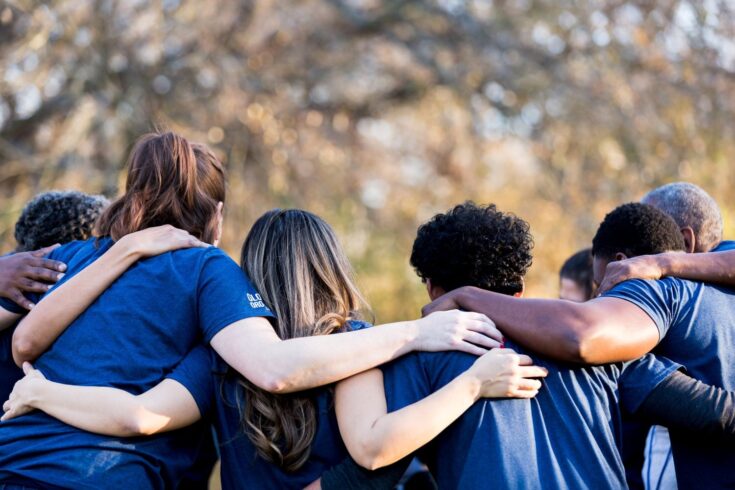A thought experiment
In his book, What we owe the Future, William MacAskill offers a thought experiment. So far roughly 100 billion people have lived on our planet. Currently there are about 8 billion. But on a not unrealistic prognosis, if all those past people were represented by 10 figures and our current population by 1, the future population would require 20 pages to depict.
What kind of future do we want for them? For the people whose lives we can directly relate to, our children and grandchildren, and to the unimaginably distant generations who will, nevertheless, see us as their ancestors? And how will we treat our past appropriately to learn not only lessons, but also modalities of respect, care and humility which we can project forwards?

Credit: Adene Sanchez, E+ via Getty Images
At the Arts and Humanities Research Council (AHRC), we considered our obligations across space and time, whether it be to older generations or to the young or to those as yet unborn.
We recognise that this involves complex issues of legal, philosophical and economic thought, and deploys the ingenuity and creativity of all the disciplines in collaboration in offering solutions and reframing problems. It offers a lens through which to see a range of seemingly disparate but equally pressing issues – how change is managed and understood, how we address the changes to our environment, how past and present intersect, how lived experience, participatory research and indigenous voices are needed to make our present be more attuned to our past and our future, near and far.
What we’re doing now
When we looked at our portfolio, we found that we already have strong foundations in this area.
As Justin Lewis, Director, Clwstwr has told us:
This year’s BEYOND 2022 conference takes its lead from the Welsh Government’s Wellbeing of Future Generations Act. It’s a simple idea: everything the government does should be mindful of – and geared towards – the health and happiness of generations to come. Yet turning that into purposeful policy – for a more sustainable and inclusive creative economy – is more difficult.
The conference will consider the role of the Creative Industries, and the Creative Industries Policy & Evidence Centre is doing vital work on the environmental sustainability of the Industries themselves.
Another example of the link between past and future can be seen in our Heritage Borders of Engagement Network (ENGAGE).
The ENGAGE Network aims to develop an evidence-based understanding of the role and potential of heritage sites, practices and communities in developing long-term sustainable and inclusive peace across conflict-prone border regions through creative modes of cultural productions, education, tourism, interdependent economy and social justice. It uses the notion of ‘humanitarian heritage’ as common endeavour of humanity that is indiscriminate about human race, culture, ethnicity or religion.
As we study the life cycle, we look from youth to age. Stable Futures: Improving Participation, Life Chances and Outcomes for Children and Young People following Human Trafficking and Modern Slavery seeks to identify which outcomes of care and protection are most important from the perspectives of young people on their views, knowledge or experience of human trafficking to ensure their experiences are at the centre of policy and law.
Ages and Stages: translating research into practice is a continuing research collaboration between Keele University and the New Vic Theatre exploring the impact of theatre on ideas about, and the experience of, ageing. The project sets out to establish an intergenerational theatre company at the New Vic; develop and tour new performance pieces; deliver a pilot inter-professional training course focused on intergenerational drama; and scope out the potential for a Creative Age Festival in north Staffordshire.
Embracing the challenge of an intergenerational approach informs our programmes from our projects on place and Creative Communities but is perhaps most visible in our ambition to create opportunities in law, which centre on ‘the conditions that allow us to flourish or falter, alert to the challenges of the present and the possibilities for the future’.
Embedding intergenerational justice
This is just a start. We want to work with our communities in the widest sense, from schools to community groups, from museums and galleries to universities, to develop the theme of intergenerational justice as a leit-motif of our work. Convening thought and action leaders, to challenge and transform how we understand our role as a public funder. We want to embed intergenerational justice across UK Research and Innovation and the wider research and innovation ecosystem, with a view to benefitting wider society in addressing contemporary challenges.
Intergenerational justice captures our commitment to the deep and recent past, to the most pressing challenges of an inequitable world, and our imaginative engagement with the near and distant future.
Macasakill offers 3 rules of thumb for facing our uncertain but vital future:
- take actions that we can be comparatively confident are good
- try to increase the number of options open to us
- try to learn more
Arts and humanities offer the bedrock methodologies and enabling techniques for all of this, bringing a comparative and historical perspective, rigorous imagination, and an infinite curiosity about what it is to be human. And however daunting the future may be, to be fully human is to see ourselves as part of the greater company of humanity. We will learn from how we treat our past how to think about our future; we can see in a generous appreciation of our past how to act today in order to be better ancestors for our future.

Credit: howtogoto, Getty Images Plus via Getty Images
Where next?
As part of our wider commitment to working with our communities to capture the best and boldest ideas from across the arts and humanities, and to help us strategically position AHRC to better support research that can make a difference in our world, we will be re-opening our Where Next scheme in January 2023.
Top image: Credit: SDI Productions, E+ via Getty Images




